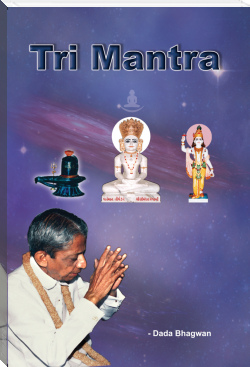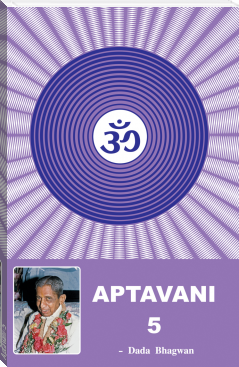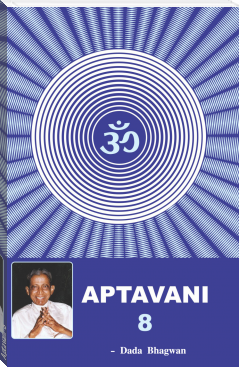Aptavani-9 by Dada Bhagwan (best english books to read for beginners txt) 📖

- Author: Dada Bhagwan
Book online «Aptavani-9 by Dada Bhagwan (best english books to read for beginners txt) 📖». Author Dada Bhagwan
When deceit in any form does not remain, when no thoughts of passion for sensual pleasures remains, and when the kashayas are eradicated, then the awareness that arises will result in ‘knowledge’ (gnan).
When one moves away from the shelter of the Gnani Purush, kashayas will invade with all their family members. These kashayas will try by any means to make one leave the shelter of the Gnani Purush. If a slightest of sweetness is tasted, the kashayas get their nourishment. If the kashayas are not given any food at all, they will come to extinction. But they become strong if they are fed!
The status of Gnani is achieved when there comes a level of awareness that not a single kashaya ever gets any feeding; such awareness is needed. Kashayas can be won over only if one is subservient (aadhin) to the Gnani and remains under His shelter and never leaves it.
Unless the Gnani Purush certifies you, don’t even attempt to preach. All the faults within you are ready and waiting to attack at a moments notice. When all the kashayas are eradicated, such a stage (of becoming certified) arrives by itself!
Awareness is the state where the ‘thief of kashaya’is not allowed to enter. In such awareness, one can see all his faults and his ego. This ego is definitely there and it makes one taste the sweet juice of doer-ship (garvaras). When someone says, ‘you did well’, he tastes the sweetness of doer-ship right away. This will cause his fall later on! Gnan exists where there is no difference between bitter or sweet.
In satsang, explanations to anyone’s questions should not be given by anyone other than the Gnani Purush. Only simple and natural talks are allowed, but the slightest weight given to the relative self, will give rise to the poison that will kill the Self.
The kashayas that are lying dormant are eradicated by the increasing awareness. The one in whom awareness has taken hold, should take advantage of the awareness by doing samayik and pratikraman, meaning introspective meditation and repentance respectively, to annihilate the faults.
There is great fun in walking behind Dada as His child. Dada will pick you up if you become Dada’s child whereas, if your ego expresses like a grown up, then you have to walk by your self and wander around aimlessly! Then after taking a beating, you will turn around.
The intense greed and desire to be worshipped is a terrible disease, it is suicidal; someone will bow to you and then it will become a habit.
The Soul (Self) is already revered by all and one is trying to get his body worshipped, which is going to become ashes one day! Liberation is prevented because of this disease.
When one creates a path that is slightly independent from the Gnani’s, he enters into a terrible maze. Once you have been told that you should follow the Gnani, how can you afford to have a diversion? How can you take such a risk? In the end, it will cause a terrible fall!
Whatever comes across as hindrance in the path to liberation should be quickly plucked and thrown out. Then only can one stay focused on the goal. If the goal is set for liberation but the intentions are impure, one will lose the goal. That which makes one lose the goal is the enemy.
When one wants liberation, he has to become so strong and make a decision that ‘come what may, whatever may become of this body, let it be, but I will not forsake the path of liberation. I want to accomplish my goal’, and for such a one the work, the goal will be accomplished. Only this intent and a firm decision have to be made.
After knowing from the Gnani Purush these dangerous chasms that exist on the way to liberation, one has to be in a constantly cautious state about them. It is worth being free from the faults by expressing them directly to the Gnani and by turning away from them. Do not attempt to gain any recognition or worship in the path to liberation. The goal of salvation for the world cannot be harbored with any intent or sense of doer-ship and there is no place for ego in it. One has to walk in the path of liberation without being recognized. One must not give up Gnani Purush’s Satsang or the Gnani’s shelter all the way to the final liberation.
One should not see the faults of the Gnani Purush; he should not find mistakes in the Gnani Purush. If nine of the Gnani’s statements are understood and one statement is not, that one statement should be put aside and one should ‘wait and watch’. It will be understood later.
9. ‘I-ness’ (potapanu) : The Supreme Soul (parmatma)
The Gnani Purush has oneness(abhedta) with the whole world; he has no separation from anyone. Separation will be there only if the Gnani Purush had buddhi (intellect)! He who is without buddhi (intellect) has oneness with the universe.
Oneness increases the experience of Gnan and separation scatters all the energies. When ‘I-ness’ is gone the separation is gone and there is oneness with everyone.
This A. M. Patel has given up all His ‘I-ness’ and has offered it to the Lord. Know that the one whose ‘I-ness’ is gone has achieved oneness with God.
‘I-ness’ is completely gone from the Gnani Purush. He behaves completely according to the circumstances and without ego. Like a ‘bundle’, He goes everywhere He has to go! One can remain in his natural state when ‘I-ness’ is gone. He does not have any opinion of his own at all! Yet, His life’s interactions are ideal. He remains ‘dramatic’ (superficial) all the time. One can only remain dramatic if his ‘I-ness’ is gone.
It is ‘I-ness’ to protect the relative self. To protect the relative self in a deceitful way is known as gaaddha potapanu (severely deep rooted ‘I-ness’).
What is the test to check whether the ‘I-ness’ is gone? If there is no change in the facial expression or within, even after one is asked to get in and out of a car nine times over, then his ‘I-ness’ is gone. The knowledge of scientific circumstantial evidence (vyavasthit) frees one from ‘I-ness’ ( potapanu).
Except for the Gnani Purush, everyone has ‘I-ness’. When the ‘I-ness’ is gone, one becomes God!
Once ‘I-ness’ is gone; it is gone forever.
After receiving Gnan, the ego that charges karma is gone but the discharge ego still remains and that discharge ego is known as ‘I-ness’. When the entire discharge ego is gone, one is said to be free from potapanu.
‘I-ness’ is decreased in proportion to the level of awareness. What kind of awareness is required to get rid of ‘I-ness’? The awareness of, ‘This is ‘I’ (the real Self) and this is not I’, a constant awareness of the Self, following the Agnas of the Gnani Purush and seeing others as faultless and as non-doers; all these are required.
No matter what the result is, saying ‘I am not this’ makes one free.
Where ‘I-ness’ is gone; there is no ego of doer-ship, and no wallowing in worldly pleasures (garavata).
To favor the side of the ego, to favor the side of ignorance, to step away from the Self; is called ‘I-ness’ (potapanu).
Not to become absorbed (tanmayakar) in the scientific circumstantial evidence is purusharth (Self oriented effort). Pragnya, which is the force of the Soul, prevents this absorption process in the unfolding scientific circumstantial evidence of the non-self, whereas agnya i.e. the intellect will make one get absorbed in the unfolding scientific circumstantial evidence.
Everyone has ‘I-ness’ in the unfolding karma. After attaining Gnan, as one employs purusharth in the unfolding karma, the ‘I-ness’ decreases and gradually vanishes.
The one who can recognize and see the departure of ‘I-ness’ in the Gnani Purush, is eternally blessed and graced.
With the departure of ‘I-ness’ (aapopu), one becomes the supreme Self (parmatma). Thereafter, scientific circumstantial evidence will take care of Him.
Jai Sat Chit Anand
Note to the reader
The words ‘You’ or ‘Self’ when they begin with an initial capital ‘Y’ or ‘S’ respectively, refers to the Soul or the real Self or the Atma. Otherwise, they are used for the non-self, also referred to as the relative-self, ‘Chandulal’ or the prakruti.
Whenever Dadashri uses the name ‘Chandulal’ or the name of the person Dadashri is addressing, the reader should insert his or her name for exact understanding.
Whenever Dadashri uses the term ‘we’, he is referring to the Gnani Purush and ‘Dada Bhagwan’ who is the fully enlightened Lord within him.
The words Self and Soul are interchangeable. The Soul is one’s real Self.
Aptavani 9
[1] Obstinacy (aadayee) : Sulking (risavu) : Manipulative tantrums (tragu)
The Gnani Purush’s words are worth understanding
The Gnani Purush’s words are actually straight. Moksha (liberation) too is straight. Everyone is allowed into moksha; it is not as if someone is barred from it. However, one must be worthy of it. It is not possible to attain moksha if one walks a crooked line. Therefore, why not become straight from the very start? Moksha is not difficult to understand, but it helps to know what the Gnani Purush is saying. If you do not understand what He is saying, you will become confused. The words of the Gnani Purush remain true for all times; the past, present and the future. Any word the Gnani Purush utters is exactly what the Tirthankaras (fully enlightened beings who liberate millions) have said.
You should follow the instructions of the Gnani Purush. Why? Who can be called a Gnani Purush? It is the one who is straight in every way. He is straight while insulting and straight while being insulted. However, when He does insult, He does not truly insult because He is straight to begin with, so how can He? ‘We’ have become frank and guileless right from the start. And as far as you are concerned, you will have to get rid of your obstinacy (aadayee ), will you not? How long can you go on being obstinate and inflexible? You will realize your obstinacy when some day it surfaces from within. Another way to realize your obstinacy is when you come to the Gnani Purush; you will be surprised to learn how much obstinacy remains within you.
Will you not have to become straight?
Questioner: Why does obstinacy (aadayee) not go away?
Dadashri: How can it go? It has made a home within you for many days and then there is the unwritten renter’s law of our land; a renter never leaves once he rents your home. So is the obstinacy that has entered within you, ever likely to leave?
I told one person, “Why are you being so obstinate? Be less obstinate!” He said, “One cannot survive in this world without being obstinate.” I told him, “Even a snake has to straighten up in order to enter its hole, so become straight if you want to enter moksha. If not, people will straighten you out and only then will you be able to go to moksha. People will beat you and straighten you up. So what is wrong in becoming straight yourself?” Do people not beat us and make us shape up (straighten up)?
Questioner: They do but





Comments (0)